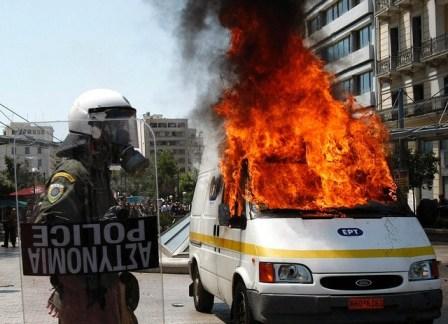
Greece’s predicament just became substantially worse. Frustrated by missed deadlines and last minute twilight dealings, Euro zone finance officials are now examining ways of delaying parts or even all of a second bailout program for Greece while still avoiding a disorderly default.
This is a dangerous game. Although Greece is not Goldman Sachs, alone, it cannot bring down the world’s entire financial system. Some are concerned the country’s default could trigger a systemic issue within Europe. Data from Athens on Tuesday showed the economy shrank, on an annualized basis, 7.0 % in the fourth quarter of 2011. A shrinking economy makes it more difficult for Greece to meet the targets imposed by the EU.
Although there are similarities with what the United States went through at the onset of the financial crisis, the issues in Europe are more complex and will take years to resolve, according to Henry Paulson, former Treasury Secretary and founder of the Paulson Institute. Paulson thinks the most important thing is protecting the banks from a big failure that could drag down the whole banking system.
The European Central Bank has made some moves to assure the “shock” of a big failure, such as a Greek default, will not cause a ripple effect across the entire system. At the end of 2011, ECB President Mario Draghi took a step in the right direction to stabilize the banks with a liquidity injection. The ECB launched a long-term refinancing operation (LTRO) in December, offering banks three-year loans at its record low 1% interest rate. Another LTRO is scheduled for Feb. 29, 2012.
Despite the ECB’s moves, rating agency Moody’s warned yesterday it may cut the triple-A ratings of France, Britain and Austria and it downgraded six other European nations including Italy, Spain and Portugal, citing growing risks from Europe’s debt crisis. Moody’s move was less aggressive than rival agency Standard & Poor’s, but its action put England’s top credit rating in jeopardy for the first time.
Moody’s stated it was worried about Europe’s ability to undertake the reforms needed to address the crisis and the amount of funds available to fight it. It also said the region’s weak economy could undermine austerity measures by European governments as they attempt to fix their finances.
On the positive side, China just announced it will “get more involved” in supporting Europe and sustain its holdings of euro assets. This announcement spurred overnight gains in Asian stocks and gold. China, which holds the world’s largest foreign-exchange reserves of $3.18 trillion, has previously indicated it wants to diversify its holdings away from U.S. dollar-denominated assets.
So what’s next? Stay tuned, like the Twilight series this saga is far from over.



 Follow us on Twitter
Follow us on Twitter Become our facebook fan
Become our facebook fan












Comments are closed.